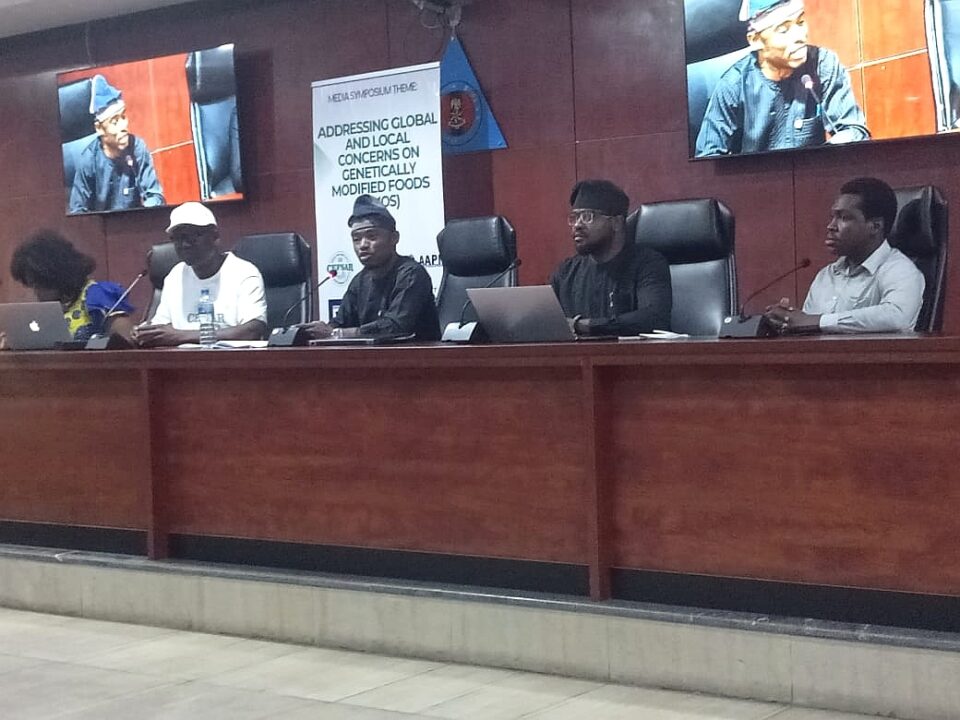By Felix Khanoba
Professor Qrissturberg Amua, a distinguished chemist, and other experts on food safety and nutrition have sounded a dire warning about the potential dangers of Genetically Modified Organisms (GMOs) in Nigeria.
Speaking at a symposium/press conference on ‘Addressing Global and Local Concerns on Genetically Modified Foods’, in Abuja on Wednesday, the experts expressed deep concern over international companies pushing GMO products into Nigeria without adequate research approval and certification.
Professor Amua, the Executive Director of the Centre for Food Safety and Agricultural Research (CEFSAR), criticized the narrative that portrays GMOs as a solution to hunger in Africa and the Third World.
“They are riding on the narrative that Africa and the third world is hungry, so GMOs is seen as a silver bullet to end it”, he said at the event jointly organised by CEFSAR, Environmental Rights Action (Friends of the Earth), Alliance for Action On Pesticides in Nigeria (AAPN), Project Print and HOMEF.
Amua described GMOs as biological weapon that posed a serious security risk for the country.
“GMOs are transgenic crops, transgenic organisms, for example they extracted a gene from a lizard and incorporated it into a tomato and you say it is natural.
“Genetic modification is you extract a gene from a snake and you can plant in a rice to give you a trait you want. That is why I’m on a record calling on the security architecture of this country to advise the political leadership of this country about the inherent security breach GMOS can bring.
“That means I can manipulate a lizard to have a venom of a snake and that lizard you thought is an ordinary lizard can give you effect of a snake bite. They are biological weapons, because they can be engineered….
“The crops are security threat, because anything can be put inside. They can engineer that crops. They can alter the system of the soil to lack required nutrients,” Amua said, even as he called for National Assembly’s intervention.
“We are calling on the House of Representatives to ensure that all the research are done and certify before Nigerians are exposed to these weapons of mass destruction,” he added.
He accused those pushing for GMO acceptance in Nigeria of prioritizing financial gain over public safety, noting that many global regulatory agencies’ claims of GMO safety are backed by research funded by GMO manufacturers.
The Professor of Chemistry also pointed out the adverse health effects of GMOs on Nigerians, including memory loss, cancer, diabetes, and other severe ailments.
“Today, it has been proven from research that these GMOs are promoting diabetes ailments in young children, teenagers, twelve year old are going down with diabetes because these things are affecting the hormonal systems of people.
“Also young people who are not even fat are going down with hypertension. They will deceive you and say it is because you are sitting down in one place for too long or you are eating processed foods.
“The third one is early memory decay where young people in their 40s begin to lose their memories. The rate at which young people are losing memory is alarming,” he said.
Donald Ofoegbu, Coordinator of the Alliance for Action on Pesticide in Nigeria, emphasized the need for public involvement in the GMO debate, as it affects the food consumed by everyone.
He lamented the extensive use of hazardous pesticides by Nigerian farmers, many of which are banned in Europe, and the consequent extinction of beneficial insects like butterflies and bees.
Ofoegbu also highlighted attempts by powerful entities to weaken regulatory standards for pesticides and GMOs in Nigeria, pointing out legislative efforts to strip the National Agency for Food and Drug Administration and Control (NAFDAC) of its regulatory powers.
“There has been deliberate efforts to remove NAFDAC. Two laws have passed through the national assembly to remove the power of NAFDAC as regards to pesticide regulation in Nigeria, they are doing same on GMOs and they have asked Nigeria to stand behind them, ” he said.
Mariann Bassey Orovwuje of Environmental Rights Action, Friends of the Earth, echoed the sentiment of widespread opposition to GMOs among Nigerians and questioned why these products should be imposed on the populace.
She expressed concern that the National Biotechnology Development Agency (NABDA), instead of regulating GMOs, appears to be promoting them.
The AUTHORITY reports that the symposium was organised to provide a comprehensive evidence based conversation platform for experts, media professionals, policy analysts and the public to discuss and explore the multifaceted issues surrounding GMOs.
The event also seek to bridge the knowledge gap and foster informed knowledge on the implication of GMOs for food safety, environmental sustainability and agricultural practices.




